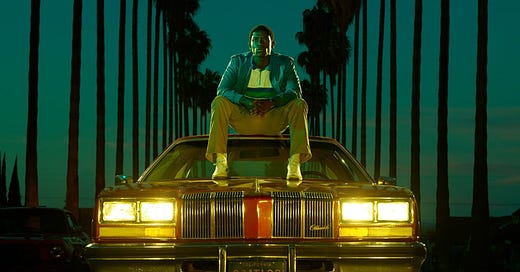Author’s note: Spoilers for all seasons of Snowfall
I. Pray
“The game’s rigged. It ain’t made for people like us, so you know what? I’m rewriting the rules.” – Franklin Saint
Stop me if you’ve heard this story before. Young black person living in an impoverished environment, striving to build a better life. This person initially tries to play by the rules but is getting no results. An opportunity to achieve their version of the American Dream suddenly falls into their lap and they have to make a choice: follow the road most travelled or go down another path, a path more glamorous and treacherous, a villainous journey paved with heroic intent.
II. Sweet
“You played by the rules and you got screwed. I’m making up my own rules and I bought you a house.” – Franklin Saint
The allure of the gangster lifestyle has existed for centuries. It evolved from the cowboy outlaws in the mid-to-late 1800s to the drug kingpins that dominated the 1980s. For the law-abiding citizen, the stories of these individuals was an excuse to indulge in the darker aspects of human nature, a chance to glance at the underbelly of society from a safe distance. But there are certain tales that have elevated themselves from mere power fantasies to timeless tragedies: The Wire, The Sopranos, Breaking Bad, and most recently, Snowfall.
The beautiful and unnerving thing about shows like Snowfall is that you can see yourself in them. You can see yourself in the protagonist’s desire for better things, in their family members’ concern for their well-being, in their victims’ horror at their actions. Over the past two decades, these series about ‘difficult men’ have partially functioned as a Rorschach test on ambition and morality. How far are you willing to go to achieve your goals? Who would you be willing to sacrifice? What would be your point of no return?
In his searing essay I’m Not Black, I’m Kanye, Ta-Nehisi Coates wrote that “for black artists…the weight is more, because they come from communities in desperate need of champions.” The same is true of fictional characters. This is the reason why Pusha T namechecked Avon Barksdale on “Pain”, why ‘coke rap’ still exists as a sub-genre, why Franklin Saint already has a whole album devoted to his exploits – those under the thumb of capitalism will always cherish the stories of those who seem to rise above it.
III. Fallin’
“And that’s why this whole thing is about to fall apart…even if you do understand, it doesn’t make a difference.” – Franklin Saint
According to the Ancient Greek philosopher Aristotle, a great tragedy should inspire pity or fear. It should have an ending that comes by surprise but feels built by design. Its protagonist should fall not in spite of their character but because of it. The steeper their rise, the deeper their descent.
The problem with identifying with a gangster is that you already know how their story ends. Master P once asked if there was a heaven for a gangster and the answer seems to be a resounding ‘no’, the sinner must pay for their crimes.
It’s been almost a year since Snowfall’s series finale aired and the last image of the show still haunts me: a disheveled Franklin, now a splitting image of a man he despised, left with nothing but a belly full of liquor and a head full of escapades that nobody will believe. A black Prometheus who ended up with a fate worse than Icarus.
IV. American Gangster
“You think we’re the first people in this world to play dirty. Carnegie. Mellon. F***** Rockefeller. They were all killers.” – Franklin Saint
In one of his most famous monologues, the eponymous Scarface tells his audience to “say goodnight to the bad guy”. Lately, I’ve been asking myself, who gets to be the ‘bad guy’?
Since the 1970s, the ‘bad guy’ has tended to have a darker complexion, whether it was the Italians like Michael Corleone, the Cubans like Tony Montana or the African-Americans like Nino Brown and Stringer Bell.
Like Tony Montana, Franklin Saint was willing to be the ‘bad guy’ but so were those who made their money during Prohibition, who built dynasties on the back of indignities, who have museums and concert halls named after them due to generous donations and generations of selective memory.
These are people who have now been held up as industry titans, masters of fate that successfully flew on the wings of destiny. The only difference between them and the American Gangster is the whitewashed glory that covers their story.
Further Listening
[1] Jay-Z, American Gangster (2007)
[2] Skyzoo, The Mind Of A Saint (2023)
Further Reading
[1] Abe Beame, Trickle Down: “Paid in Full,” A Reagan-Era Crack Masterpiece, Passion of the Weiss
[2] Michael A. Gonzales, American Dreamers: On Frank Lucas, Jay-Z and a New York City Crime Epic, CrimeReads
[3] Josie Duffy Rice, The Gospel According to Pusha T, The Atlantic
[4] Mike Sager, Say Hello to Rick Ross, Esquire
Thank you for reading! Please feel free to like, leave a comment, share this post and / or subscribe for more content down the line.





There Will be Bloods.